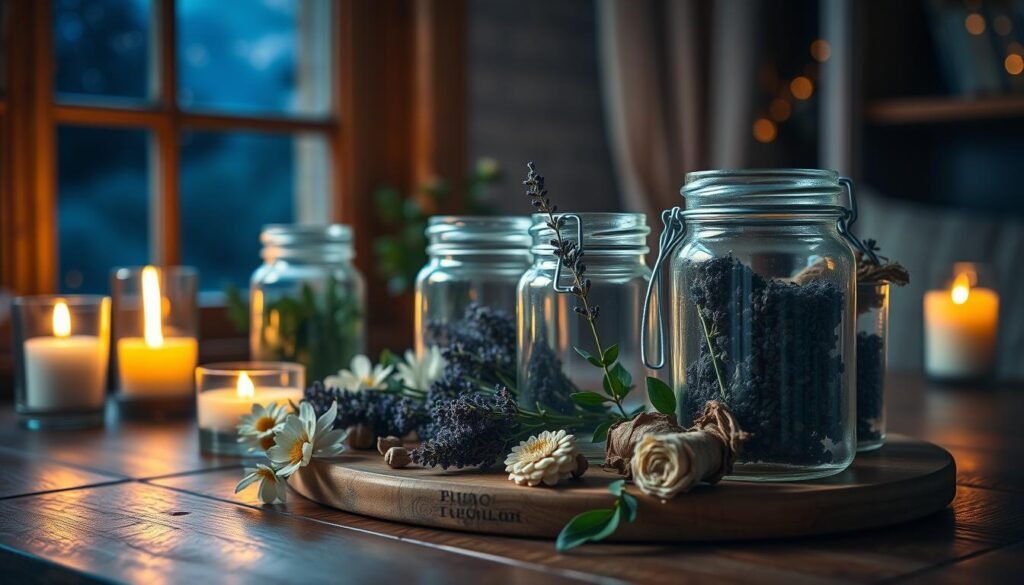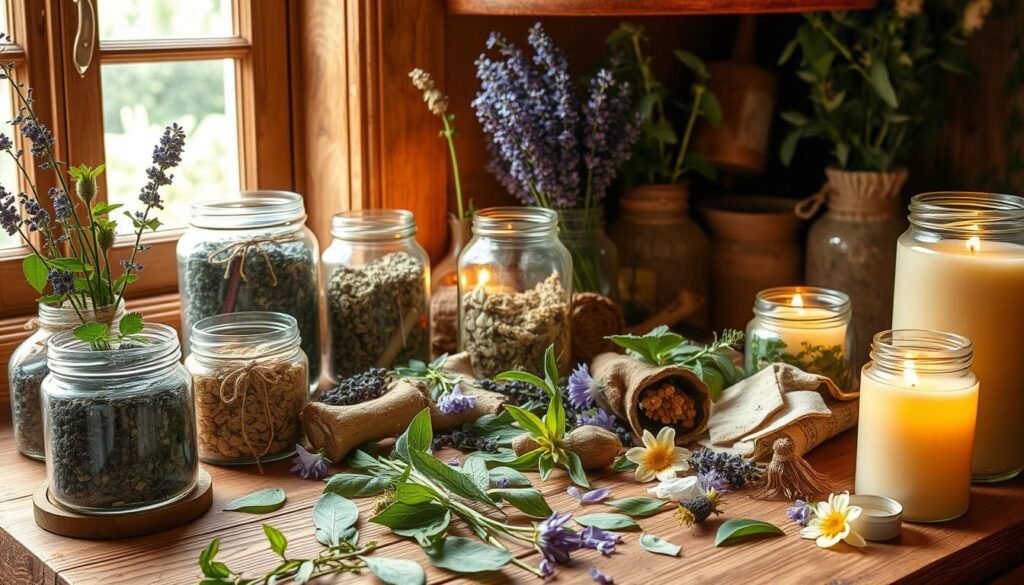Did you know as many as 15% of people struggle with regular insomnia? This leads to a lot of daytime fatigue, irritability, and trouble focusing. With such high numbers, it’s clear why lots of Americans are looking for natural ways to deal with insomnia. They prefer them over usual sleep drugs.
More and more people are interested in natural solutions. They are trying herbs like valerian root, chamomile, and ashwagandha. These herbs may help improve sleep without the need for medication.
This article will look at different herbal remedies. We will see how they might help you sleep better and feel healthier.
Key Takeaways
- 15% of people regularly experience insomnia, impacting their daily life.
- Natural remedies for insomnia are gaining popularity as alternatives to medications.
- Herbal sleep aids like valerian root and chamomile are explored for their effectiveness.
- Insomnia can lead to significant daytime dysfunction and mood alterations.
- Understanding the causes of insomnia can help in choosing the right treatment.
Understanding Insomnia and Its Impact
What is insomnia? It’s when you have trouble falling or staying asleep. This problem can hurt both your body and mind. Insomnia can make you feel sleepy during the day, easily annoyed, and generally lowers your life’s quality. Over time, this issue can turn from a short-term problem into a long-lasting one. It can make existing health problems worse.
Insomnia is linked to serious health concerns. These include heart disease, diabetes, and a greater chance of feeling anxious or depressed. Research has found that over 60 million in the U.S. face issues with sleeping well. Insomnia’s effects go far, leading to weight gain and increased heart disease risk.
Knowing about insomnia and its signs is important. This helps people look for the right treatment. Some herbal treatments, like Matricaria recutita and Melissa officinalis, offer a bit of help. While these herbs help some people sleep better, they often don’t work as well as other treatments.
Common Causes of Insomnia
Insomnia can come from many sources, often mixing in complex ways. One top cause of insomnia is emotional upset. Stress, anxiety, and depression lead the pack. These feelings tie to about half of all insomnia cases, making good sleep hard.
Lifestyle choices play a big part in insomnia triggers. Bad habits like not sleeping at the same time, too much caffeine or alcohol, and using screens late can ruin sleep. Noise, light, and not-so-comfy beds also mess up sleep. To sleep better, make your bedroom quiet and cozy. A calming bedtime routine helps too.
Health problems can make sleeping hard. Conditions like asthma, allergies, and certain cancers are culprits. Also, some meds, like for depression or high blood pressure, can disturb sleep. Knowing these factors helps those with insomnia find better ways to deal with it. They can try lifestyle changes or natural remedies for relief.

Natural Remedies for Insomnia: An Overview
Many people look for natural remedies for insomnia to improve their sleep. They turn to herbal solutions like valerian root and chamomile. These herbs are not only calming but also tackle the root causes of insomnia.

Herbal medicine has been around for over 5000 years, especially in China and India. It shows the value these remedies have in health care. Today, about 80% of the world, mainly in less developed regions, use herbs for health issues, including sleep problems.
Making lifestyle changes is also key to fighting insomnia naturally. Eating well and exercising regularly are important. Techniques like meditation can also make a big difference in sleep quality and overall health.
Research points out that herbs like chamomile significantly help the elderly sleep better. Valerian root is another herb known for aiding with sleep issues when used in large amounts. It highlights the importance of a comprehensive approach to improve sleep.
To learn more about natural sleep aids, one might want to check out detailed guides on natural remedies for insomnia. Such an approach brings together various techniques, ensuring people find effective and safe options for better sleep.
Insomnia Treatment Herbal: Effective Options
Looking into herbal treatments for insomnia can offer good solutions for sleep problems. Valerian root and chamomile are top herbs known for helping with sleep.
Valerian Root
Valerian root comes from the Valeriana officinalis plant. It is known for making sleep better and decreasing the time it takes to fall asleep. However, its effectiveness can vary from person to person. It might cause headaches, dizziness, or stomach issues.
People who are pregnant, breastfeeding, or have liver problems should be careful. Valerian root can also interact with other medicines and supplements. So, it’s important to talk to a healthcare provider before starting it. Even with these concerns, valerian root is still a favored sleep supplement.
Chamomile
Chamomile tea is widely loved for its calming effects. It’s usually safe for everyone, but some might react if they’re allergic to similar plants. Adding chamomile to your daily routine is simple.
It helps with relaxation and can be part of your nighttime rituals. For many looking for natural options, chamomile improves sleep quality successfully.

Other Herbs and Herbal Supplements for Sleep
Many effective herbal sleep aids exist beyond the well-known ones. These alternatives improve sleep quality. They show how vast the world of sleep herbs is.
Ashwagandha
Ashwagandha, known for reducing stress, is a strong adaptogen. It helps in improving sleep resilience. Featured in ZzzQuil PURE Zzzs Sleep + De-Stress Gummies, ashwagandha aids in better sleep, particularly for those whose anxiety affects sleep.
Passionflower and Lemon Balm
Passionflower combined with lemon balm enhances sleep. Though research is limited, they are promising together. Passionflower is in ZzzQuil’s PURE Zzzs Restorative Herbal Sleep, providing 160 mg per serving. These herbs demonstrate the effectiveness and diversity of herbal sleep solutions.
| Herb | Active Component | Benefits |
|---|---|---|
| Ashwagandha | 300 mg | Reduces stress, enhances sleep resilience |
| Passionflower | 160 mg | May help with anxiety and promote relaxation |
| Lemon Balm | N/A | Calming effects, may enhance sleep quality |
Alternative Therapies Complementing Herbal Treatments
People are looking for ways to beat insomnia. Adding alternative therapies to herbal treatments can help. Acupuncture for insomnia is one method getting attention for improving sleep. This practice from traditional Chinese medicine works on specific points in the body. It might help get your sleep patterns back on track.
Acupuncture for Insomnia
Studies show acupuncture can help with sleep problems. It might make you feel more relaxed and reduce insomnia symptoms. Acupuncture focuses on the body’s energy paths. It aims to bring back balance and support natural sleep.
Relaxation Techniques and Meditation
Using relaxation methods can boost the power of herbal remedies. Things like meditation, muscle relaxation, and breathing control can make a big difference. They relax your mind and body, helping you drift off to sleep and stay asleep. Using these techniques regularly can also lower stress. This makes it easier to enjoy deep, restful sleep.
Mixing these alternative methods with herbal products is a well-rounded way to handle insomnia. It also boosts your overall health. Checking out natural therapies might lead to better sleep habits.
| Therapy | Benefits | Considerations |
|---|---|---|
| Acupuncture | May improve sleep quality and regulate sleep patterns. | Requires training; effects can vary by individual. |
| Relaxation Techniques | Promotes relaxation and reduces stress. | Needs regular practice for effectiveness. |
| Meditation | Helps calm the mind, leading to better sleep. | May take time to master; consistency is key. |
When to Consider Professional Help
Insomnia is common, affecting 10% to 30% of adults. Many try herbal remedies but ongoing symptoms for over three months might mean it’s time to seek professional help. Knowing when insomnia is chronic is key to getting the right support.
If insomnia messes with your day or causes a lot of stress, getting an insomnia diagnosis from a doctor is a good idea. Sleep apnea or mental health issues often need expert care, showing why professional help is vital.
Cognitive Behavioral Therapy for Insomnia (CBT-I) is usually the top recommendation for lasting sleep problems. It helps fix sleep routines, negative thoughts, and behaviors affecting sleep. If CBT-I doesn’t cut it, doctors might suggest medicine too.
Some medicines, like certain antidepressants and off-label antipsychotics, might be used for insomnia. Yet, it’s important to be careful with benzodiazepines and Z drugs because they can cause dependence. Always talk to certified experts to choose the best treatment. A thorough treatment plan can lead to better sleep over time.
Knowing when to get professional sleep help is crucial for handling insomnia. Taking action early can improve life quality and wellness.
| Medication Type | Examples | Risks |
|---|---|---|
| Benzodiazepine Receptor Agonists | Quazepam, Triazolam | Dependence, tolerance |
| Z Drugs | Ambien, Lunesta | Adverse effects, unusual behaviors |
| Melatonin Receptor Agonists | Ramelteon | Limited side effects |
| Orexin Receptor Antagonists | Suvorexant | Controlled substance risks |
Safety and Side Effects of Herbal Treatments
Natural remedies are getting more popular. So, understanding herbal treatments’ safety is key. Many people use herbs for health issues, like insomnia. It’s vital to talk to healthcare providers before trying herbal products. This is especially true if you’re already on medications or have health problems.
Herbal supplements can cause side effects. For example, valerian root can help with sleep but may cause headaches, dry mouth, or drowsiness. While often safe, it can interact with psychiatric medications. Everyone reacts differently to herbs, which is why being careful is important.
Herbal products can interfere with prescription drugs. Ginkgo biloba, though beneficial, might increase bleeding if you’re on blood thinners. Knowing about these risks is crucial for using herbs safely.
Herbs like echinacea or St. John’s wort have benefits but also risks. Echinacea can cause stomach pain or skin rash. St. John’s wort might lead to dizziness and sensitivity to light. Being aware lets people make wise health choices.
Herbal solutions are appealing, but we need to be careful and thoughtful. Talking with health experts about herbal safety leads to smarter and safer wellness choices.
Conclusion
Exploring herbal treatments for insomnia shows many options for those wanting natural sleep aid. Most people prefer to search online instead of talking to doctors. This shows a big interest in natural remedies. Herbs like Valerian and Chamomile are promising because they work well and are safer than drugs.
These herbs help by making the GABA signal in the brain stronger, leading to better sleep. Scientists are still learning about how all this works. They’re studying different GABA receptors. This research could lead to new ways to treat insomnia. It shows we need treatments designed for each person because everyone reacts differently to herbs.
To wrap up, choosing herbal treatments for better sleep is a good and safe option. There’s a growing demand for natural cures. People should explore all choices and talk to doctors to find the best plan for them. This plan should help them sleep better and feel refreshed.